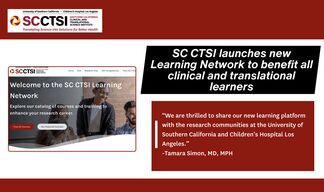SC CTSI’s Research Recruitment Resources Featured in Trojan Family Magazine
Much of the new technology being developed at the SC CTSI is aimed at finding qualified candidates and filling clinical trials as quickly and efficiently as possible.
As an academic medical center, Keck Medicine of USC makes these medical discoveries happen through the rigorous testing of clinical trials. Yet testing new therapies for safety and effectiveness can take years. Across the nation, some clinical trials are never completed, for reasons that have nothing to do with the treatment itself. Some studies are slow to get started because finding and enrolling qualified participants can be challenging. With the number of U.S. clinical trials growing rapidly during the last decade, it can be tough to recruit enough patients to fill them. Likewise, patients drop out of trials, which can slow progress or derail the trial completely. It’s a problem that vexes health advocates and drug companies.
But researchers are trying to overcome these hurdles by going digital. “By developing new technology, we are making our clinical trials faster, more efficient,” says Thomas A. Buchanan, vice dean for research at the Keck School of Medicine of USC and director of the Southern California Clinical and Translational Science Institute (SC CTSI). Much of the new technology being developed at SC CTSI is aimed at finding qualified candidates and filling clinical trials as quickly and efficiently as possible. The ultimate aim is to speed promising and safe treatments to more patients sooner.
How is technology changing clinical trials?
It can take a long time to sift through thousands of medical records looking for patients who are right for a clinical trial. Each study of a new drug or device has its own set of specific requirements. To join a trial for a new chemotherapy drug, for example, patients might need to have tried a list of other medications first. Or to take part in a study on a new breast cancer detection technology, participants may have to have dense breast tissue. Matching patients to trials can be a painstaking process.
But USC’s Daniella Meeker may have a shortcut. The director of the Clinical Research Informatics program at SC CTSI works with researchers to develop search tools that can quickly scan electronic medical records to see how many Keck Medicine and Children’s Hospital Los Angeles (CHLA) patients meet the trials’ criteria.
Researchers can screen for patients with a specific diagnosis, procedure, age range and results on blood tests. Knowing the number of patients in the area that meet the criteria can deter-mine whether and how quickly a trial can be filled, says Meeker, who is also an assistant professor of preventive medicine. If a trial is launched, the researcher may also be able to use those medical records, if approved by the Institutional Review Board, to reach out to patient volunteers who might be interested in participating.
Take trials to the patients
Patients today turn to social media to find support and a community that can share information about their disease, notes Katja Reuter, assistant professor of clinical preventive medicine and director of digital innovation and communication at SC CTSI.
To tap into these groups, Reuter and a team from the SC CTSI created Trial Promoter, an open-source tool that sends out automated posts on social media such as Twitter, Facebook and Instagram about new and ongoing clinical trials. It also collects data on how the messages are received and shared.
Reuter also launched a project with USC Norris to use Twitter in a more targeted way in the Los Angeles area, locating and messaging users with any of six types of cancer—breast, colon, prostate, kidney and lung cancer, as well as lymphoma — to inform them about recruitment for clinical trials.



